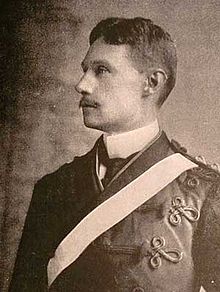Thomas Pilcher
| Thomas David Pilcher | |
|---|---|

Pilcher, photographed in South Africa c. 1900
|
|
| Born | 8 July 1858 |
| Died | 14 December 1928 (aged 70) |
| Allegiance |
|
| Service/branch |
|
| Rank | Major-General |
| Commands held | 2nd Bn Bedfordshire Regiment Bangalore Brigade Burma Division 17th (Northern) Division |
| Battles/wars |
Second Boer War First World War |
Major-General Thomas David Pilcher, CB (8 July 1858 – 14 December 1928) was a British Army officer, who commanded a mounted infantry unit in the Second Boer War and the 17th (Northern) Division during the First World War, before being removed from command in disgrace during the Battle of the Somme.
Pilcher spent his early career as an infantry officer, first seeing active service on colonial campaigns in Nigeria in the late 1890s followed by field command in the Second Boer War (1899–1902), on which he published a book of lessons learned in 1903. Following the war, he held a number of senior commands in India. However, further promotion was checked by his having come into conflict with his commander-in-chief, who regarded him as unsuited for senior command in part because of his writings; Pilcher was a keen student of the German army and its operational methods, and an active theorist who published a number of controversial books advocating the adoption of new military techniques as well as an anonymous invasion novel.
On the outbreak of the First World War he was on leave in England, and eventually obtained the command of 17th (Northern) Division, a New Army volunteer unit. The division supported the initial attacks at the Battle of the Somme in July 1916, where Pilcher again clashed with his superiors over his refusal to push on an attack without pausing for preparations, believing it would result in failure and heavy casualties. After ten days of fighting, Pilcher was sacked and sent to command a reserve centre in England. From here, he wrote a series of books before retiring in 1919. He ran as a parliamentary candidate for the splinter right-wing National Party in the 1918 general election, and continued a loose involvement with right-wing politics which extended to membership in the early British Fascisti.
...
Wikipedia
